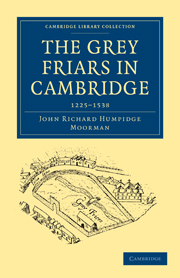Book contents
- Frontmatter
- Contents
- PLATES
- MAPS AND PLANS
- Preface
- Chapter I The House of Benjamin the Jew: 1225–1267
- Chapter II The Friars and the University: 1225–1306
- Chapter III The New House
- Chapter IV Domestic Affairs
- Chapter V Some Activities of the Friars
- Chapter VI The Franciscan School at Cambridge in the Fourteenth Century
- Chapter VII The Latter Years
- Chapter VIII The Dissolution and After
- Appendix A Custodes, Wardens, Vice-wardens and Lectors
- Appendix B Biographical Notes on Cambridge Franciscans
- Appendix C The Dispute between the Friars and the University of Cambridge, 1303–6
- Appendix D James Essex's Observations on the Old Chapel of Sidney College in Cambridge
- Appendix E Fragment of an Account-book belonging to the Cambridge Franciscans
- Appendix F Legacies
- Appendix G Documents connected with the Dissolution
- Appendix H Seals of the Cambridge Franciscans
- Index
- Plate section
Chapter VI - The Franciscan School at Cambridge in the Fourteenth Century
Published online by Cambridge University Press: 07 September 2010
- Frontmatter
- Contents
- PLATES
- MAPS AND PLANS
- Preface
- Chapter I The House of Benjamin the Jew: 1225–1267
- Chapter II The Friars and the University: 1225–1306
- Chapter III The New House
- Chapter IV Domestic Affairs
- Chapter V Some Activities of the Friars
- Chapter VI The Franciscan School at Cambridge in the Fourteenth Century
- Chapter VII The Latter Years
- Chapter VIII The Dissolution and After
- Appendix A Custodes, Wardens, Vice-wardens and Lectors
- Appendix B Biographical Notes on Cambridge Franciscans
- Appendix C The Dispute between the Friars and the University of Cambridge, 1303–6
- Appendix D James Essex's Observations on the Old Chapel of Sidney College in Cambridge
- Appendix E Fragment of an Account-book belonging to the Cambridge Franciscans
- Appendix F Legacies
- Appendix G Documents connected with the Dissolution
- Appendix H Seals of the Cambridge Franciscans
- Index
- Plate section
Summary
In the quarrel between the University and the friars in 1303–6 the friars were in a strong enough position to defend themselves against the attacks of a body which not unnaturally resented the presence of theological schools which owed no allegiance to the Chancellor of the University and the corporation of regent masters. But though that dispute was settled, there remained material for further disagreements, for the fundamental question of the status of the friars in the University was left unanswered, and it was clear that there would be trials and troubles until this matter was cleared up. The fourteenth century saw this struggle, and in its latter half there was considerable tension between the two bodies, but in the century or so before the Reformation the University was making such strides forward, and increasing so greatly in power and prestige, that it was able more and more to enforce its will on the friars. But it was not until the Dissolution of the religious houses in 1536–9 that the problem was finally solved.
The settlement reached at Bordeaux on July 17th, 1306, seems to have been regarded by both sides as a reasonable compromise, for there is no sign of any further dispute for about fifty years, although Oxford was shaken by the bitter dispute between the University and the Dominicans which lasted from 1311 to 1320. During this period the Franciscan school at Cambridge seems to have made considerable progress.
- Type
- Chapter
- Information
- The Grey Friars in Cambridge1225–1538, pp. 93 - 113Publisher: Cambridge University PressPrint publication year: 2009First published in: 1952

